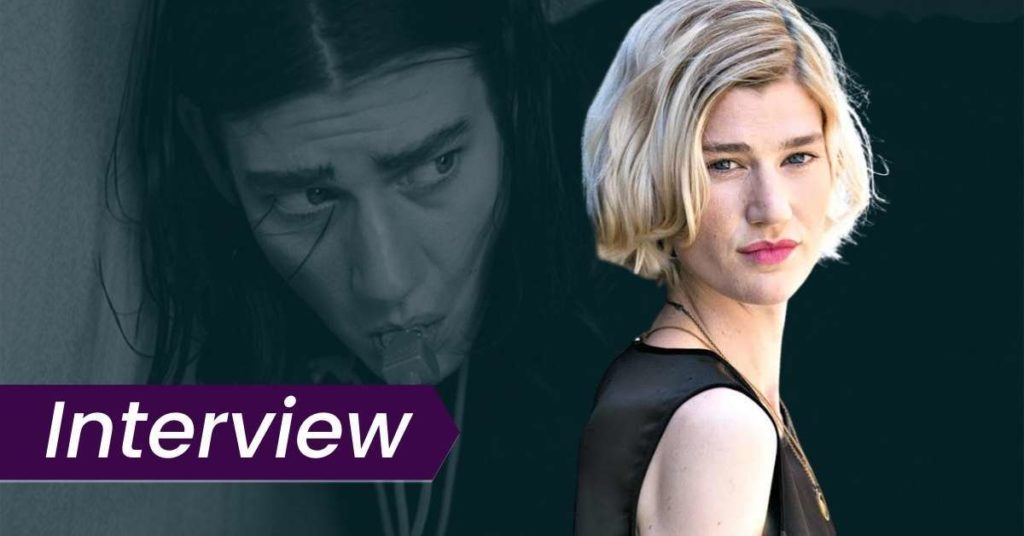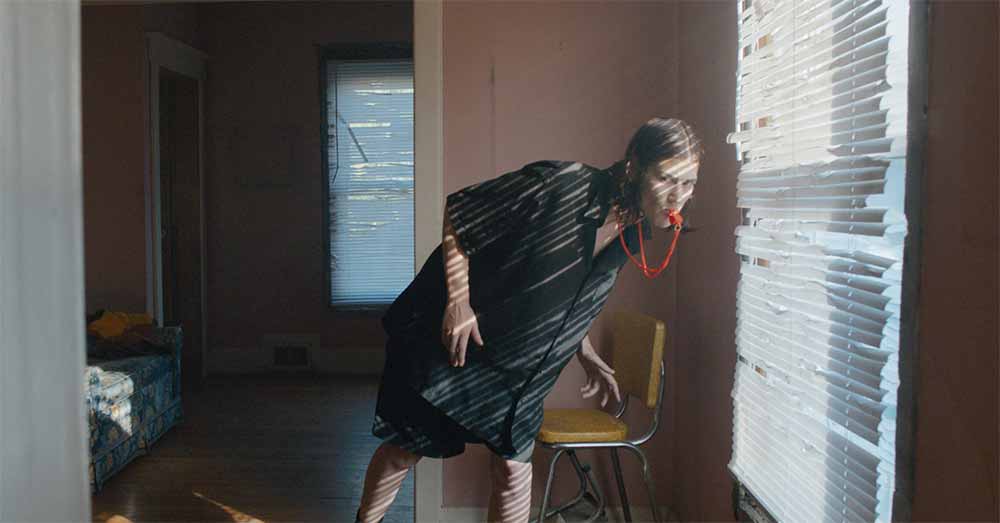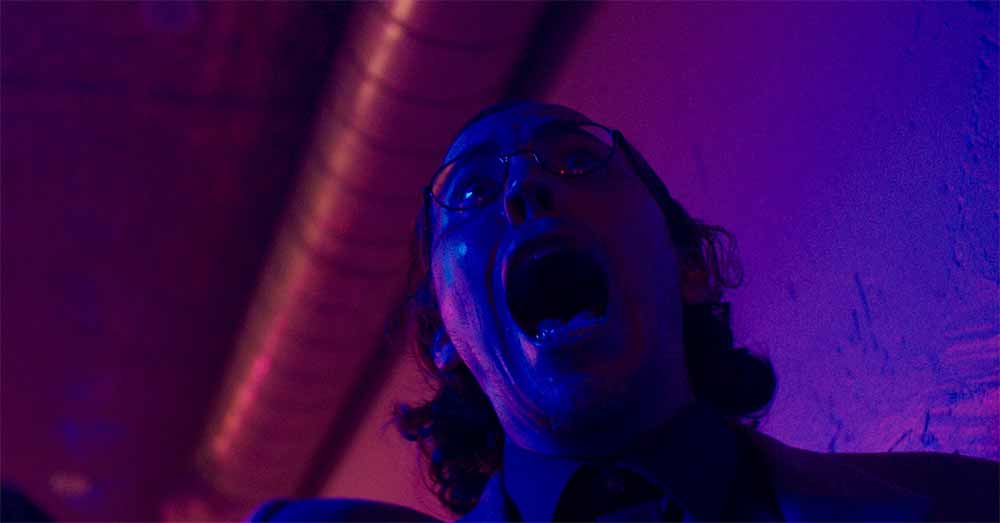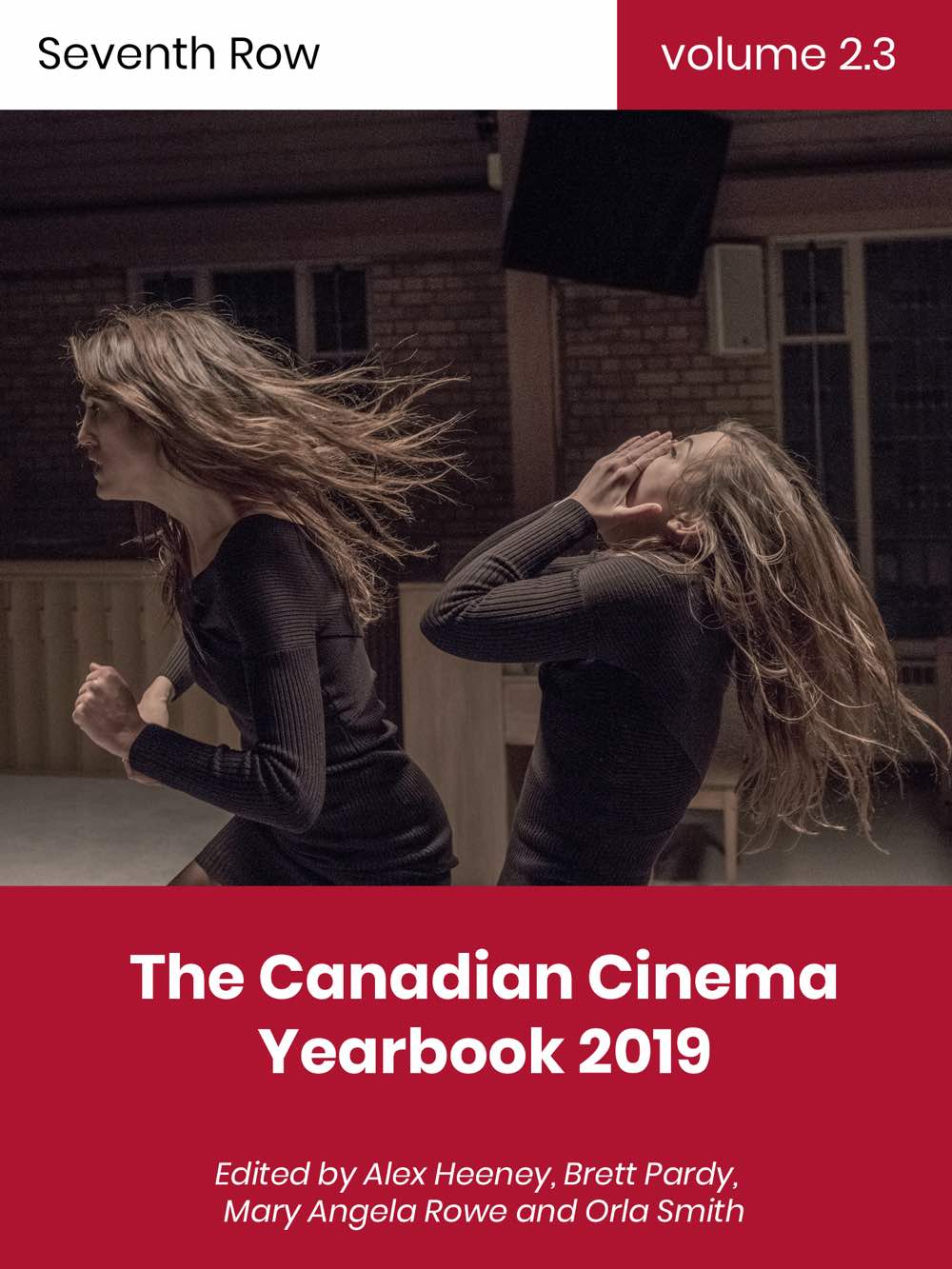After her Canadian Screen Award nomination for Best First Feature, we spoke with multi-hyphenate Grace Glowicki about Tito, her oddball directorial debut.
Tito is available to rent or buy on VOD in the US and Canada.

Never miss a great film again. Get exclusive content and hidden-gem recommendations you won’t find on the website.
Click here to sign up for the Seventh Row Newsletter.
Grace Glowicki’s debut feature, Tito, defies succinct summation. It’s more concerned with immersing the audience in the titular protagonist’s psyche than it is with plot or character development. Tito (played by Glowicki) is a man haunted by trauma, which the film implies is at least partially tied to a previous sexual assault. He rarely talks, is constantly nervous, and can’t leave the house without an unbearable amount of anxiety.
The sound design (also by Glowicki) and cinematography (by Christopher Lew) mirror Tito’s discomfort and help the audience understand and empathize with his emotional state. In one scene, a starving Tito summons the courage for grocery shopping but has a panic attack before he can buy everything that he needs. The entire scene in the store is underscored by a persistent ticking sound that explodes into monster-like gurgles when he freaks out and leaves. As a result, Tito is forced to eat off-brand Froot Loops with water instead of milk. Shot from low angles, Tito often just barely fits into the frame. If not for his perpetual hunch, his head would be cut off in every shot. After puking this sad dinner all over the living room floor, he sits in bed, dejected and half-heartedly blowing the red rape whistle that accompanies him everywhere. This feeling of paralyzed helplessness is one that remains throughout the entirety of the film.
There is a tonal shift when Tito’s next-door neighbor, John (played by Glowicki’s real life partner, Ben Petrie), shows up uninvited and starts cooking breakfast. Tito, who has never met John before, freaks out over the unexpected invasion. Instead of apologizing for this social ambush, John hits Tito with cheerful stoner vibes and a healthy dose of “I’m just trying to help” gaslighting. After a few puffs on John’s joint, Tito relaxes and the two settle into an Odd Couple-esque routine. John supplies the weed, Tito provides shelter, and something like friendship develops.

As time progresses, John’s problematic personality traits grow harder to ignore, and it becomes obvious that he has no plan of leaving Tito’s house. Being unable to escape an interloper is my personal nightmare, so this progression (along with the ending, which I won’t spoil) quickly turned Tito into a horror movie for me. Nothing is more unsettling than being in a vulnerable state and having someone who initially seems okay take advantage of the situation.
After first watching Tito at SXSW in 2019 and thinking about it off and on since, I’m glad that I finally got to speak with Grace Glowicki. Tito is such an oddball first feature with a polarizing critical reception, but I really enjoyed it and think that Glowicki has a real talent for sensitive character portrayals and immersive, experimental storytelling.
I’ve been interested in Glowiki as an actor since watching her in Ben Petrie’s short film, Her Friend Adam (2016), where she reminded me so much of a young Laura Dern that I had to do a double take. She’s likewise fantastic in Harry Cepka’s Raf (2019), and the more recent Strawberry Mansion (2021) by Albert Birney and Kentucker Audley. At this point, I’m so loyal to her as an actor that I’ll watch whatever she’s in, even if it’s not something I would normally gravitate towards. Watching her take on positions behind the camera — writer, director, sound designer, and editor (along with Brendan Mills) on Tito — has been exciting, and I hope to see more from her in this capacity going forward.
Tito was recently nominated for Best First Feature Film at the Canadian Screen Awards. On this occasion, I spoke to Glowicki (and her dog, Dilly, who made a guest appearance) via Zoom about how she got into acting, the types of characters she likes to play, and what she learned from making Tito.
Seventh Row (7R): How did you get into acting? Did you always know that you wanted to direct and write as well?
Grace Glowicki: I went to McGill [University], and I was in art history, waffling between different majors. I switched to English and then did film studies. In the second year, I had a boyfriend who was the Editor-in-Chief of one of the student newspapers, and I remember being like, “Okay, extracurriculars … maybe there’s something to it.” So, I randomly auditioned for a play. I had no theatre experience in high school. I just went for it for some strange reason. I got the part and then fell into the Players’ Theatre crowd. I felt like I had found my people.
After graduating from McGill, I moved to Toronto to try to be an actor. I got a shitty job and struggled to get an agent. I was really lucky because I lived with a friend from McGill named Harry Cepka [who would later direct Glowicki in Raf]. We ended up buying Canon 60D cameras together and started filming little comedy sketches where I would do these characters and he would film. The performance style you see in Tito originates from our collaboration and his encouragement for me to go outside the box with reckless comedy.
Eventually, I got an agent in Toronto and fell into a more conventional, independent acting situation. I had a bit of success with that, but I hit a point where I felt like I had these performances in me, but people weren’t ready. I just didn’t have the material to express myself as an actor. It was starting to feel like I was playing too many stupid roles that were very underwritten for a female performer, which frustrated me.
When Ben [Petrie] made Her Friend Adam, I got to experience how well that film did, and to see him make it from beginning to end really inspired me. I thought, okay … I can do this. Ben inspired me [to see] that I could direct, so I did. I loved it and want to do a lot more of it. I have a Telefilm Talent to Watch Grant, so I’ll hopefully be making my second feature in six-ish months.
7R: How does the grant work?
Grace Glowicki: When I got it, it was $150k to make a first feature. I qualified for it because Tito was only seventy minutes long, which doesn’t count as a feature by Telefilm guidelines. It was kind of a mid-length loophole that I squeezed through.
7R: Did you always know that Tito was going to be on the shorter side?
Grace Glowicki: We had a longer cut for a while, but I just felt like we were stretching footage. Even at seventy minutes, one of the common criticisms of the film is that not much happens and it could have been a short film. I think my impulse to tighten that ninety-minute cut we had for a while to seventy was probably the right call. But also, it’s a shorter film because we shot it in seven days, which is pretty ridiculous for a feature. We only had about two takes — sometimes, one take of each camera angle. We really didn’t have tons of footage. I think we had maybe four hours of footage for the edit.
7R: Where was it filmed?
Grace Glowicki: We found a house up in the Junction [in Toronto]. We were walking around and saw this very strange house. I was looking for a house that looked like it was almost a tiny house… something with odd, gingerbread proportions that felt right for a sole person. When we found it, the owner was about to tear it down. We offered to give him a couple of tickets to TIFF movies if we could shoot there, and he was like, “Oh, TIFF! Okay!”
7R: What did you want to convey with Tito? I’m not looking for a mission statement or anything, but I am curious about how you wanted the film to feel.
Grace Glowicki: I ended up doing a Kickstarter campaign where I felt elusive pressure to articulate the film into a gender politics or political thesis, which in retrospect was a mistake because it wasn’t actually true. The film is an exploration of feelings of anxiety that I experienced during a period of time in my life. I’m a woman, so of course, those anxieties are gendered in some ways. It’s definitely complicated, but at its core, it’s an exploration of fear and anxiety and the effects that has on behaviour and physicality.
7R: Do you think it’s because of your decision to play a male role?
Grace Glowicki: I really feel like I have both masculine and feminine energy in me. Gender is such a complicated thing. What even is masculine and feminine? I was exploring masculine energy that I feel is inside of me, and I believe is inside of a lot of people. I gave myself freedom to explore those different parts of myself and to express them. In comedy, like with the sketches I used to make with Harry, I often would play old, young, or a fourteen-year-old boy. In comedy, especially in troupe comedy, it’s actually a lot more commonplace to play around because there’s only so many performers. Everyone just does what they have to do. I think there’s a great freedom in breaking down the binaries of our world in that way. I find it very empowering.
7R: Forcing everyone to adhere to preconceived labels puts a damper on self-expression. I like that this film doesn’t do that. You play Tito, who is a man, but don’t deepen your voice or adopt “masculine” characteristics. It forces the audience to accept the character as he is presented.
Grace Glowicki: I sometimes think of when RuPaul says, “We’re all born naked, and the rest is drag.” I really identify with that. It’s performance on performance on performance, which makes it feel exciting.
7R: Not to typecast you, but it seems like you’re drawn to playing characters who are outsiders in some way or have a bit of social anxiety. Is that accurate?
Grace Glowicki: I’m only just realizing that it is kind of a pattern. Even the movie I’m about to make is about two loners coming together. It does seem to be a repeating thing, and it might be because I’m fascinated with the fact that we are all kind of alone in our experience. We can never really know what someone else’s experiences [are like].
I feel sensitive to that fact, and that might be why I’m drawn to and keep creating those kinds of characters. I think it’s relatable and might offer some kind of peace to someone watching the expression of that inherent loneliness of being human.

7R: I wonder if everyone is really like that at their core, but certain people are just better at hiding it. Ben Petrie’s character in Tito seems to fit into this category. He masquerades as an affable stoner, but over time, his behaviour becomes more unhinged and less forgivable. How did you envision that character’s progression?
Grace Glowicki: It was both exploring the idea of an emotionally manipulative relationship, as well as a dynamic of addiction. In some ways, he’s a foil for Tito’s character. He really quickly passes a boundary without [Tito] realising, offers salvation and a quick miracle fix to his problems, provides this honeymoon of a high that [comes with the] relief and feeling of being saved by something or someone. Then, that dynamic slowly reveals itself as being controlling and manipulative. It becomes something that just crushes you [beyond] where you started.
For a while, the character was actually called “Weed,” and I was going to paint Ben green. I think one of the greatest missteps I made as a director is not painting him green. It would have been such a cool, expressionistic pairing to have Tito as this clownish, cartoonish-looking character next to a green Ben.
I also took [inspiration from] John Goodman in Barton Fink (1991) and Sean Penn in Dazed and Confused (1993)… Heath Ledger plays a cool stoner character [in Lords of Dogtown (2005)]. I like that ‘70s California loafer who’s really bombastic. It’s an exploration of all of those things.
7R: In the bar scene, you use a title card for the first time to explain that Tito’s drink is being spiked with Rohypnol (a date rape drug). Why did you choose to include that?
Grace Glowicki: It’s interesting. No one really talks about that part. I even kind of forgot about it until you brought it up. I really like title cards. They used to be chaptered throughout the film, but then I cut them because you’re always worried they’re expositional. But then, a gal that watched it said that it might not be clear that it was Rohypnol, and it was important to me that it was. That’s probably connected to some elements of exploring female fear. [Rohypnol is] a very insidious thing that too many people I’m close to have experienced, so it was important to [make that explicit in the film] by adding the card.
Thematically, it’s just the point where Tito has been slowly manipulated and pushed against himself. Psychologically, his control had been taken from him. At the end, It was important for me to have his complete agency taken, including [his] consciousness. Because of that, it is very much a tragedy. I don’t think it has a hopeful ending. I do think it’s a cycle, and he ends up worse than he started. That was a moment of definitive evil, which was important to me because of my own personal experiences.
7R: Knowledge of that title card definitely changed my read of the film on rewatch. It made everything else just a little more explicit.
Grace Glowicki: It was so long ago that I edited it, but maybe the card is there for the clarity that you got. It’s funny. I forget about it now because it does feel so long ago. We shot it in 2017, so four years ago. The part of my life it references is even a year or two before that. It feels like it’s this relic of the person I was five years ago, which is so strange.
7R: Are there any films that inspired you while working on Tito?
Grace Glowicki: Holy Motors (2012) has always been a really important film to me because Denis Lavant is a performer that [helped me] understand what expressionistic performance can be. I’m always holding him up on this pedestal in my mind.
Under the Skin (2013) has been a really powerful film for me. [Jonathan Glazer’s] use of surrealist spaces in that film was great, but also like… woman as prey, and that kind of vibe. The Mica Levi soundtrack is dear to me. That was the music I listened to when I was trying to find the fear and the pulse of it when I was building the character. Eraserhead (1977) was a film that I watched a lot for its singular vision. It’s an expressionistic film that doesn’t follow conventional rules.
Then, funnily enough, Gaspar Noé’s Love (2015) is an important film for me because I find it very simple. It uses tableaus, and it’s very stylish. It’s literal in a way that I actually am quite interested in. The music is also very literal. Sometimes, I find that we mistake things that are really nuanced or complex as intelligent, and we think that simple things can’t be profound. I don’t think in these complicated narratives, so I appreciate filmmakers that are also doing things a little more bluntly.
7R: The physicality of the character of Tito and the sound are really what immersed me so much in Tito. How did you explain what you wanted to your composer, Casey Manierka-Quaile?
Grace Glowicki: He never read the script, and for the longest time, didn’t even see any of the film because I wanted to work with him in an improvised, emotional way. I wanted to build a score from sounds instead of melodies. I would send him a word document that had all of these different sentences or feelings or pieces of imagery. I would say, “Improvise on the piano for X amount of time. Just explore the feeling of panic.” He would do that, and then send me these long improvisations. I would take pieces of that improv and then layer them in the edit until I felt like I had created something that I liked. Then, he would come in and congeal it and smooth it and add a couple things here and there.
I picked an instrument for each aspect of Tito’s emotional life. The clarinet represented his numbness, the piano represented his joy and his sadness, the drums represented his heartbeat, and the electric guitar was John. Casey doesn’t even play some of those instruments, but he was just so game for the exploration. He picked up a clarinet, which he had never played, and just blew around for a bit and sent me that improv.
7R: You had so many roles on this film. You also co-edited, right?
Grace Glowicki: I edited the film with Brendan Mills, and then I did the sound design solo. I really love filmmaking and part of me is interested in shooting a movie one day. I think I get a little greedy because I enjoy all of it and I haven’t had the chance to do much of it before.
I really took liberties and was like, “Okay… I’m going to try this, and I’m going to try that.” I fall in love with all the different aspects, and now I can’t imagine not doing the sound design for the next one. There’s such a dynamism to filmmaking that I found really empowering. When you’re just an actor, you’re only allowed to have so much control and agency.
7R: It has to feel nice to see yourself in the finished product. As an actor, I’m sure that’s not something you get to feel very often, even when it comes to your performance.
Grace Glowicki: Yeah, it’s true. I’ve had many experiences where I’ve felt like I wanted to bring something [specific] to a performance. Then, when you get there, they say, “No, that’s not what I want. I want you to do it like this.” At a certain point, if you’re not working with the right people, you just start to feel that your agency is gone. You’re saying what people have written for you. You’re moving like they ask you to. They’re controlling your voice, what you wear, the way you move. But in the end, your name’s on it, so your identity is connected to it. I’ve found it a complicated thing… agency and acting in other people’s work.
When you find a director that really believes in you, and you really trust [them], and they’re very smart — like Harry or Ben or Grayson Moore — it’s different.

7R: What were Tito and John watching the night they got stoned together on the couch? It reminded me of the opening credits to Bewitched (1964-72) or something.
Grace Glowicki: It was a real pain in the butt because we had gotten into South by [Southwest], and then, all of a sudden, we’re like, “Oh my gosh, we need royalty-free footage, or we need to get the rights to footage.” It was a mad dash. I ended up being able to buy it on Pond5 or something. It was basically an old advertisement for some kind of… something. I don’t know if it was a PSA or a vintage animated commercial. We lifted it from the context of whatever it actually was. It was so hard because I just remember tiny usable slices before the advertisement part of it.
7R: What about the anime porn? Did someone make that for the film?
Grace Glowicki: That was also a last-minute thing where I knew that I didn’t want to have real porn. I wanted it to stay in this voyeuristic construction space of someone else’s idea of female sexuality. I figured I would do animated porn because I didn’t want to use a real person.
We found this stuff online on Pornhub or something. We just happened to notice this watermark in the bottom of each of the clips. We looked him up and sure enough, he has a Patreon account. We joined the Patreon, and then Ben sent him an email and asked for permission to use the rights for some small amount of money, and he said yes.
I’m curious if he’s ever seen the film or if any people have gotten in touch with him about it.
7R: I’m surprised he hasn’t bragged about having his work featured in a film on his Patreon. He needs to add it to his resume.
Did you learn any lessons from Tito that will carry over to your next film?
Grace Glowicki: I’ll never give a film that I make a thesis statement. That was a big mistake because it causes people to say whether or not you fulfilled that thesis statement. And also, films can have a different meaning for different people. It boxed me into an interpretation that I really didn’t like.
With directing, you have to have confidence in yourself. You really have to be direct about your intuition. If you’re not, you’re going to waste people’s time. As a director, you really need to be clear with what you want, and stand up for that little voice inside of you that knows how things need to go. I was lucky. I worked with such amazing people, so it was a nice place to learn, but that’s something that was a little harder for me, especially having never directed before. I felt insecurity like, “Ooh, do I know what I’m doing?” I learned a lot about trusting myself.
From criticism of the film, I do think the area I can work the most in is the script phase. I don’t think I’m a super strong writer. I think I’m a strong expresser and interpreter, and I can do mood and character and tone and colour, but plot isn’t my strong suit. I’m trying to focus on learning about writing an entertaining, engaging story, along with the idea of character development. I had never worked with a distributor or a sales agent, so that was also a whole learning curve.
7R: Distribution is a very mysterious part of the filmmaking process to me. I’ve read about it so many times but my brain doesn’t want to retain that information. It seems like the type of thing you have to experience to really grasp.
Grace Glowicki: It’s like those people who are scared to do their taxes. It seems like this big beast, but then the minute you start, it gets demystified, and it’s not as scary as it initially seemed.
Tito is available to rent or buy on VOD in the US and Canada.
You could be missing out on opportunities to watch great films like Grace Glowicki’s Tito at virtual cinemas, VOD, and festivals.
Subscribe to the Seventh Row newsletter to stay in the know.
Subscribers to our newsletter get an email every Friday which details great new streaming options in Canada, the US, and the UK.
Click here to subscribe to the Seventh Row newsletter.


